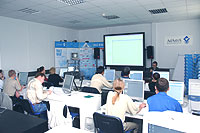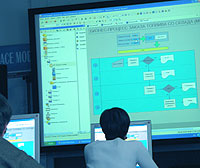 T-B-6-EN T-B-6-EN
CONTROL SYSTEMS DEVELOPMENT IN TRACE MODE 6: BASIC TRAINING COURSE
Duration: 5 days (40 h.). Language: English
The course is targeted to control engineers and programmers, having no experience in TRACE MODE. The course provides the main skills for control systems design using SCADA/HMI TRACE MODE, for PLC connectivity and PC-based controllers programming. The students obtain printed didactic materials and documentation. The graduates get diploma.
Day 1
- 1 lecture. The AdAstra's company profile. TRACE MODE 6:
 main features, composition and methods of use. Basic design concepts. main features, composition and methods of use. Basic design concepts.
- 2 seminar. Installation of the integrated development environment. General settings. The integrated development environment as a tool for uniform project development. Development methods.
- 3,4 lecture. Project structure. Project components: descriptor, node, channel, attribute. Calls of screens, programs, database queries, documents. Arguments. Operations in the Project Explorer.
Day 2
- 1,2 lecture. Node editing. Channel editing. Primary data processing. Description of data sources/receivers. Autobuilding. Making channels in project nodes and connecting to descriptors.
- 3 seminar. Making a simple HMI (HMI visualization of data from remote I/O module via ASCII protocol through built-in driver/through ОРС-server, interaction with Windows applications through DDE).
- 4 seminar. Training project demonstration and analysis.
Day 3
- 1 lecture. Project development technologies. Development techniques: graphics centered development, I/O centered, distributed. Component libraries.
- 2 seminar. Training project. Making project database: nodes, channels, descriptors for sources/receivers, links setup.
- 3,4 lecture. TRACE MODE 6 programming tools. Program templates. IEC 6-1131/3programming languages: Техно ST, FBD, SFC, LD и IL. Program editor. Argument editor. Input/output arguments. Variables, constants, functions. Data types. Compiling and debugging. Program calls in the project nodes. Linking to channel attributes in project nodes.
Day 4
- 1,2 lecture. Training project. Making a PID loop program in FBD and a digital control in ST. Making an object model. Control loops emulation. Program check up in debugger. Program calls. Channel autobuilding with argument editor, automatic argument linking to channel attributes.
- 3 seminar. Training project. Channel base structuring in nodes, main nodes settings - processing cycle, network.
- 4 seminar. Training project. Channel and node setup for data logging to SIAD/SQL realtime database and for alarm report. System dictionaries.
Day 5
- 1 lecture. HMI screens editor. Screen templates. Screen call in the project node. Screen arguments for data presentation. Resource libraries.
- 2 lecture. Basic concepts: screens, layers, graphic elements, graphic objects.
- 3 seminar. HMI screen. Graphic elements. Graphic elements dynamization.
- 4 seminar. Graphic objects features. Making a dynamic HMI screens with objects.
Trainings are carried out in a well equipped class. Training cost depends on number of trainees by PC.
 T-X-6-EN T-X-6-EN
CONTROL SYSTEMS DEVELOPMENT IN TRACE MODE 6: EXTENDED TRAINING COURSE
Duration: 10 days (80 h.), including the Basic training course. Language: English
The extended training course includes the basic course (T-B-6-EN). The course is targeted to control engineers and programmers, having no experience in TRACE MODE. The course provides comprehensive information about control systems design using SCADA/HMI TRACE MODE, for PLC connectivity and PC-based controllers programming and also background information about MES-EAM-HRM systems development with the using T-Factory.exe. The students obtain printed didactic materials and documentation. The graduates get the TRACE MODE Certified Engineer diploma. MODE. The course provides comprehensive information about control systems design using SCADA/HMI TRACE MODE, for PLC connectivity and PC-based controllers programming and also background information about MES-EAM-HRM systems development with the using T-Factory.exe. The students obtain printed didactic materials and documentation. The graduates get the TRACE MODE Certified Engineer diploma.
Day 6
- 1 lecture. Training project. HMI screens development for monitoring and control.
- 2 seminar. Training project. Linking of screen template arguments with channels attributes. HMI screen emulation in graphic editor.
- 3,4 lecture. Training project. Project’s nodes export for launch in realtime. Profilers. Diagnostics and debugging tools.
Day 7
- 1 lecture. SQL-queries to external databases. DB-link templates. SQL-queries Wizard. Execution of SQL-queries in project’s nodes.
- 2 seminar. Training project. Data archiving in MS Access database.
- 3 lecture. Document’s template editor. Document (report) generation. Documentation servers.
- 4 seminar. Class CALL channels with non-adjusted types of call. Examples of applications.
Day 8
- 1 lecture. Distributed control systems. Any methods of such system’s low level development. Information flows planning. Data exchange between project’s nodes – using networking and serial communications. System and diagnostical variables. Remote loading and debugging. SPY utility.
- 2 seminar. Training project. Distributed control system development.
- 3 seminar. Redundancy in TRACE MODE 6: nodes, networking, serial communications, I/O cards, PLCs, remote modules. Training project. Operator’s PC redundancy.
- 4 seminar. Console in TRACE MODE 6. Examples of applications.
Day 9
- 1 lecture. Data logging. Alarm report and dump. Diagnostics and control tools in realtime. Setting and using of SIAD/SQL 6. Archiving levels.
- 2 seminar. Sampling and data processing. Local and remote archives. Archives in memory. Redundancy of archives, data synchronization.
- 3 seminar. I/O drivers. T-COM specification.
- 4 seminar. Conversion of projects v.5 to v.6, features and limitations. Examples.
Day 10
- 1 lecture. T-Factory.exe 6 as a tool of business processes control and monitoring in realtime. T-Factory 6 integration with TRACE MODE 6 and other applications.
- 2 seminar. T-Factory project creation and demonstration.
- 3,4 seminar. Answers the questions.
Trainings are carried out in a well-equipped class. Training cost depends on number of trainees by PC.
 TF-B-6-EN TF-B-6-EN
MANUFACTURING AUTOMATION SYSTEM DEVELOPMENT IN T-FACTORY 6: BASIC TRAINING COURSE
Duration: 5 days (40 h.). Language: English
The present course is a prolongation of study programs TRACE MODE 6 T-B-6-EN or T-X-6-EN. The course is targeted to control engineers, programmers or IT-specialists, having experience in TRACE MODE 6 on basis of BASIC TRAINING COURSE. The course provides the main skills for business automation systems design for continuous and batch production plants, fully integrated with process control systems. The students obtain printed didactic materials and documentation. The graduates get diploma.
Day 1
- 1 lecture. T-Factory 6 - MES/EAM/HRM-realtime system: main features, composition and methods of use. T-Factory 6 nodes, nodes parameters settings. Interactions with TRACE
 MODE 6 project’s node channels. Basic design concepts of MES/EAM/HRM-applications in T-Factory 6. Algorithms programming, SQL-queries, documents and HMI screens. MODE 6 project’s node channels. Basic design concepts of MES/EAM/HRM-applications in T-Factory 6. Algorithms programming, SQL-queries, documents and HMI screens.
- 2 lecture. Realtime MES. Material and energy flows. Channel class M-RESOURSE: attributes, internal algorithms and editing in IDE. Execution of operations with resources.
- 3 seminar. Training project: thermal energy calculating system. Energy balance.
- 4 lecture. Training project: electrical energy calculating system with the tariff scale.
Day 2
- 1 lecture. Prime cost of production. Material balance calculating. Warehouse. SQL-queries - Database link templates. DB_Link_Templates Wizard. SQL-queries executions on T-Factory nodes. Data logging in SIAD/SQL and dump. Data sampling from SIAD/SQL. CANBAN concept. Achievement of just-in-time systems in T-Factory MES.
- 2 seminar. Training project: material flow management in the plant division. Just-in-time supply of the plant shop.
- 3 lecture. Accounting of the production lots. Quality control. Quality ratio. Material balance for a plant division. The primary cost of production.
- 4 seminar. Training project: development of the material balance for plant division. Primary cost control in realtime.
Day 3
- 1 lecture. Using D-RESOURCE class channel for production order generation. Production works planning. Performing network planning for production works. Correction of planning in MS Project. Production works control. Document (report) generation.
- 2 seminar. Training project: released production and used resources report development.
- 3 lecture. Realtime HRM. Brief record card of the personnel. Channel class Personal: attributes, internal algorithms and editing in IDE. Status setting. Features of using channel class Personal.
- 4 lecture. Working schedule creation. Network planning of works. Work management – orders. Document circulation. Account for executed works. Labor cost. Interaction with ERP-systems.
Day 4
- 1 lecture. Realtime EAM. Asset record database. Equipment class channel: attributes, internal algorithms and editing in IDE. Aggregates. Status setting. Downtime. Machine utilization ratio.
- 2 lecture. MTBF and MTTR asset parameters. OEE (Overall Equipment Effectiveness) accounting. OEE management in realtime. Logging the EAM-statistics. Wear-out forecast.
- 3 seminar. Training project: OEE management in realtime.
- 4 lecture. Types of EAM services. Channel class D-RESOURCE services. Report generation for orders and assignments. Asset accounting for entire life cycle.
Day 5
- 1 seminar. Training project: Maintenance system for training installation.
- 2 lecture. Maintenance work planning. Preventive and predictive works plan creation. Correction of planning in MS Project.
- 3 lecture. Controlling the execution of works, planned and actual indices. Report generation for equipment asset management.
- 4 lecture. Standalone use of T-Factory 6: DDE, OPC, ODBC. Hot redundancy of T-Factory nodes. T-Factory console, some features.
|







 T-B-6-EN
T-B-6-EN  main features, composition and methods of use. Basic design concepts.
main features, composition and methods of use. Basic design concepts.
 T-X-6-EN
T-X-6-EN MODE. The course provides comprehensive information about control systems design using SCADA/HMI TRACE MODE, for PLC connectivity and PC-based controllers programming and also background information about MES-EAM-HRM systems development with the using T-Factory.exe. The students obtain printed didactic materials and documentation. The graduates get the TRACE MODE
MODE. The course provides comprehensive information about control systems design using SCADA/HMI TRACE MODE, for PLC connectivity and PC-based controllers programming and also background information about MES-EAM-HRM systems development with the using T-Factory.exe. The students obtain printed didactic materials and documentation. The graduates get the TRACE MODE  TF-B-6-EN
TF-B-6-EN MODE 6 project’s node channels. Basic design concepts of MES/EAM/HRM-applications in T-Factory 6. Algorithms programming, SQL-queries, documents and HMI screens.
MODE 6 project’s node channels. Basic design concepts of MES/EAM/HRM-applications in T-Factory 6. Algorithms programming, SQL-queries, documents and HMI screens.




